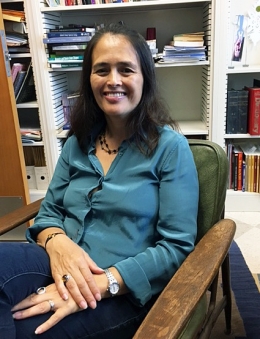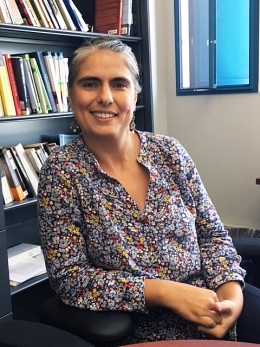By Jim Medina • UCSB

Emiko Saldivar. Courtesy photos by Jim Medina
Asking the right question is key to producing an accurate survey. Not only must the question be right — it must be asked in the right way.
Consider the first-ever tally of Mexico’s black population. To recognize citizens of African descent, Mexico’s census agency, INEGI, conducted a preliminary count in 2015 by asking: “Based on your culture, history and traditions, do you consider yourself black — meaning Afro-Mexican or Afro-descendant?” More than 1.3 million people, or 1.2 percent of the country’s population, replied yes.
But the survey is misleading, according to UC Santa Barbara researchers Emiko Saldivar and Erika Arenas, who are collaborating to help INEGI fine-tune Mexico’s 2020 Census.
“People were really happy there were finally numbers to talk about,” said Saldivar, an associate project scientist with UCSB’s Department of Anthropology, who noted she grew concerned after studying the data. For instance, the scholars said, respondents answered a litany of survey questions — likely devoting only seconds to each — and perhaps got confused by the word “Afro-Mexican,” thinking “Oh, yes, I’m Mexican,” overlooking “Afro” altogether, and thereby skewing the results.
The survey also suggested that blacks have the same access as the average person to education and public services in Mexico — a finding that didn’t ring true with the researchers, who hope to explain the discrepancies with their project.
“I thought there was something off, according to what I’ve seen in the field, to what black organizations in Mexico are demanding and to what other studies say,” said Saldivar, the principal investigator. Sociologist Arenas concurred, noting “previous studies that show Afro-descendant people live in situations of poverty and social exclusion, and lack access to social programs.”

Erika Arenas
With the goal of helping INEGI officials and black communities frame better questions for Mexico’s 2020 Census, in which “black” will debut as an official category, Saldivar and Arenas have teamed up on a two-year project titled “Measurement of the Afro-descendant population in Mexico.” Their collaboration is supported by a $372,000 grant from the W.K. Kellogg Foundation, a philanthropic organization that seeks to address issues related to children, families and communities. In this case, the foundation is interested in enhancing awareness about the importance of accurate data in tackling racial inequality and its effects on families.
The research endeavor aims to provide key information to promote an informed discussion about the inclusion of valid and reliable questions on the 2020 Census to measure the Afro-descendant population, according to the two scholars.
Until 2015, Mexico was one of only two Latin-American countries that did not officially count its black population. However, black activist groups in Mexico pushed the government to recognize Afro-descendants to improve race-related public policies, such as having elementary and high school curricula include material on Africans.
Arenas also is conducting a similar — though unrelated — project stateside. With a $25,000 grant from the University of California Institute for Mexico and the United States (UC Mexus), she is conducting a telephone survey of undocumented immigrants in the U.S.
For the undertaking, titled “The Role of Documentation Status on Mental Health.” Arenas will begin by focusing on roughly 2,000 Mexican immigrants who migrated to the U.S. from 2002 to 2010, a group she has tracked for two previous surveys. Among other things, Arenas will compare the wellbeing of immigrants in Texas and California, a state politically opposed to sanctuary cities and one that supports them.
“We can see how different policies might affect the mental health of this population,” Arenas said. She’ll also query whether any family members are affected by President Trump’s recent decision to cancel the Deferred Action for Childhood Arrivals program.
“With these policies this year, it is likely we will find that immigrants have moved more,” Arenas said of her target group. “People might not be living where they used to. That’s going to be a challenge. But we have done this twice — interviewing at least 90 percent of them both times.”
